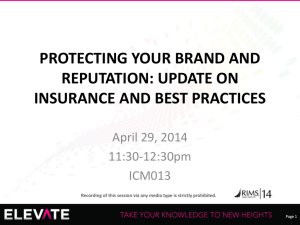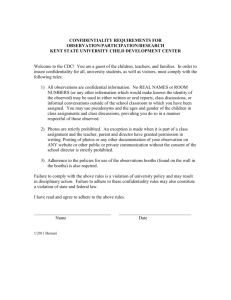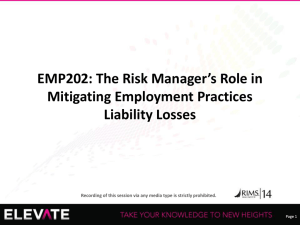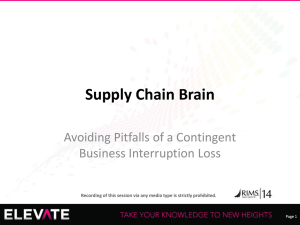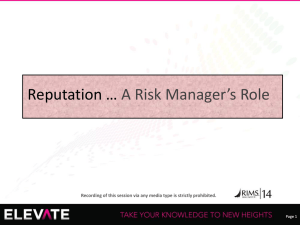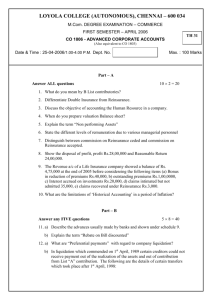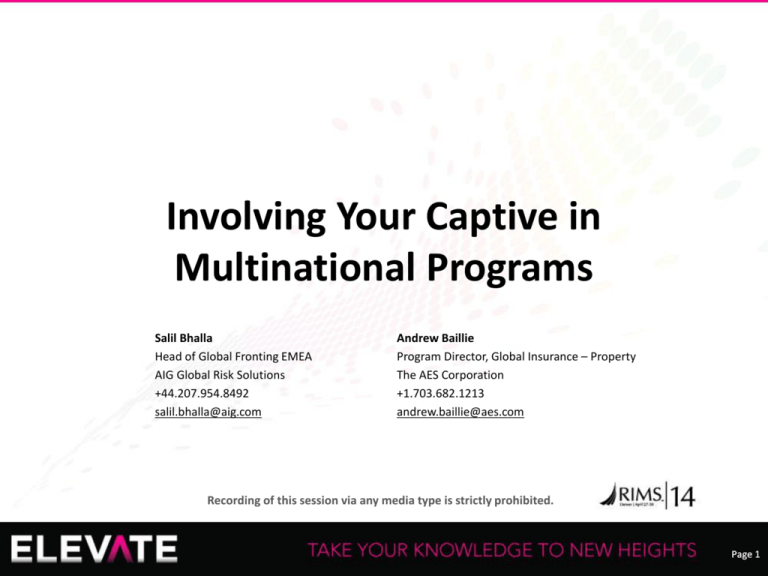
Involving Your Captive in
Multinational Programs
Salil Bhalla
Head of Global Fronting EMEA
AIG Global Risk Solutions
+44.207.954.8492
salil.bhalla@aig.com
Andrew Baillie
Program Director, Global Insurance – Property
The AES Corporation
+1.703.682.1213
andrew.baillie@aes.com
Recording of this session via any media type is strictly prohibited.
Page 1
Speaker Information
• Salil Bhalla, AIG Global Risk Solutions
Head of Global Fronting EMEA
Salil joined AIG over 20 years ago and has held several roles in
Bermuda, Continental Europe and the UK focusing on captive and
multinational programs.
• Andrew Baillie, The AES Corporation
Program Director, Global Insurance – Property
Andrew has been working with AES since 2006 and oversees a
large multinational property program that involves over $50bn of
assets in more than 20 countries.
Recording of this session via any media type is strictly prohibited.
Page 2
What to Expect
After attending this session, participants will gain
a better understanding of:
• How to implement and manage a global captive fronting
program
• Using a captive as a vehicle to finance and manage internal
risks
• Overcoming the inevitable challenges of a global program
• The importance of managing the claims process
Recording of this session via any media type is strictly prohibited.
Page 3
The Theory of Using a Captive for
International Risks
Recording of this session via any media type is strictly prohibited.
Page 4
“I think there is a world market
for maybe five computers.”
– Thomas Watson, Jr., Founder & Chairman of IBM, 1943
Recording of this session via any media type is strictly prohibited.
Page 5
C020513
Coverage Options for Multinational
Companies
Three main options for multinational companies to obtain cover for foreign exposures.
Controlled Master
Program (CMP)
Local
Global
Policies issued in countries to cover
local exposures. Each local policy is
issued by an insurer licensed in that
particular country.
Policies issued in the client’s home
country covering its worldwide
exposures. Global policies are issued
by insurers licensed in the client’s
home country
A CMP includes both local
policies and a master policy
providing worldwide coverage.
Recording of this session via any media type is strictly prohibited.
Page 6
C032813
What Is a Fronted Program?
• A form of reinsurance or indemnification whereby a commercial insurance company (the
“fronting company”):
– Issues an insurance policy to an insured, and then
– Fully or partly transfers this risk either through a reinsurance agreement with the insured’s
captive or an indemnification agreement with the insured or its parent company.
• This arrangement is typically put in place when a company needs to:
– Meet a regulatory requirement for locally admitted policies, or
– Evidence insurance for other business reasons but wants to retain all or a portion of the
underwriting risk.
• The fronted program provides local certificates and evidence of insurance to help satisfy
compliance, lender or other requirements.
• A fronted program allows for claims to be handled and settled locally.
• The fronting company charges a fee to assume the credit, operational and regulatory risk
inherent in the issuance of a policy.
Recording of this session via any media type is strictly prohibited.
Page 7
C032713
Lines of Business for Captive Programs
• Property / Business Interruption
• Extended Warranty
• Automobile
(Liability & Physical Damage)
• Aviation
• General & Products Liability
• Marine
• Workers’ Compensation & Employers Liability
• EIL
• Fidelity
• Employee Benefits
• Professional Liability / E&O
• Emerging Risks such as Cyber
• Surety
Recording of this session via any media type is strictly prohibited.
Page 8
C091813
Involving a Captive in International
Risks Takes Time and Work
Inception
Oct
Nov
Dec
Jan
Feb
Appointment process
Agree on service requirements
Understand program placement strategy
Finalize fronting requirements
Agree on premium allocation methodology
Overseas network instructions
Finalize service plan
Agree on premium allocation/cash flow
Finalize policy documentation requirements
Agree and issue claims protocol
Completion of legal documents and
collateral instruments
Recording of this session via any media type is strictly prohibited.
Page 9
C112912
And There Are Challenges
• Insurance/reinsurance regulations in each country
• Restrictions on the exportation of risk
• Cash before cover territories
• Tax considerations
• Compulsory covers and pools
• Rules governing policy wordings
• Currency restrictions
• The need for compliance
Recording of this session via any media type is strictly prohibited.
Page 10
C030513
Special Country Requirements* – BRIC
China
• Reinsurance restrictions
• 80% maximum cession
Russia
• Manuscript wordings difficult
• Need for local retention and reasonable
reinsurance commission
Brazil
• Compulsory 40% reinsurance cession to local
market
• Registered reinsurers required
*As of December 31, 2012.
India
• Offer reinsurance to local market
• Application for cash transfer
Recording of this session via any media type is strictly prohibited.
Page 11
C041513
Reinsurance
Kazakhstan:
New local retention requirements
passed January 2012.
Germany:
The German Pharmaceutical Act
was recently amended to require
reinsurance cessions and retrocessions under local and
Freedom of Service policies
covering German pharmaceutical
risks to be ceded to
“independent” reinsurers.
India:
Effective April 1, 2012, the Indian
Regulator will require overseas reinsurers
to submit information on their
management, financials, and home
licensing prior to accepting any
insurance/reinsurance or retrocessions
from India.
Brazil:
In 2011, local regulations
governing the exportability of
reinsurance took effect.
Kenya:
A compulsory 18% cession of
all treaty reinsurance has
been extended until
December 31, 2015.
Argentina:
2011 regulatory changes restrict reinsurance
exportability outside Argentina, and limit
foreign currency exportability.
Recording of this session via any media type is strictly prohibited.
Page 12
C032813
Cash Before Cover
CIMA:
As of October 1, 2011, the
insurance law that governs in 14
countries in Africa has been
amended to include a “cash
before cover” requirement.
Panama:
On April 3, 2012, Panama
implemented a new
insurance law
that sets forth certain
requirements related to
premium payments.
Ethiopia:
The Federal Government of
Ethiopia has implemented a new
“No Premium, No Cover” rule, by
which insurance policies issued
without full collection of the
premium are considered void.
Nigeria:
Effective January 1, 2013,
Nigerian insurance
policies may only be
issued once the entire
corresponding premium
has been collected.
Taiwan:
The Taiwan Non-life Insurance
Association (“NLIA”) is pushing for the
implementation of cash before cover for
auto insurance to take effect in 2013.
Nepal:
While already in application, the
Regulator only recently started to tighten
the cash before cover requirement in
Nepal.
Recording of this session via any media type is strictly prohibited.
Page 13
C032813
Canada:
The Canadian Tax Authorities in the
province of Manitoba have
announced that premiums received
for policies incepting or renewing on
or after July 15, 2012 will be subject
to a retail sales tax of 7%.
Guatemala:
Guatemala’s Reinsurance
Tax increased from 3.1%
to 5%, effective January 1,
2013.
Taxes
Europe:
While Romania and Italy had tax
decreases in some areas, increases
were noted in Cyprus, Denmark,
Finland, Hungary, and the
Netherlands
Honduras:
Effective April 30, 2012, a
reinsurance “transfer” tax of
0.15% applies to reinsurance
premiums paid to overseas
reinsurers
Israel:
Effective September 1, 2012, the
tax on commissions paid to Israeli
brokers was increased from 16%
to 17%.
Nicaragua:
Effective January 1, 2013, all
reinsurance transactions,
including assumed reinsurance
from a local carrier in
Nicaragua, are subject to a 1.5%
reinsurance tax.
Australia:
Effective October 1, 2012, the
Australian Capital Territory state
government enacted a phased
reduction in stamp duty rates on
all insurance policies until July 1,
2016, at which point all policies
will be exempt.
Colombia:
Effective August 22, 2012,
a new 2% Fire Brigade levy
applies to insurers that
issue property and energy
policies covering
petroleum, mining, or
petrochemical companies.
Recording of this session via any media type is strictly prohibited.
Page 14
C032813
Compulsory Coverage
Germany:
Effective January 1, 2013, the law requires
financial investment intermediaries to be
covered by professional liability insurance with
minimum limits. There was a transition period
until July 1, 2013, by which date these
intermediaries must have this cover in effect.
Switzerland:
A proposal for a mandatory
earthquake insurance bill was
presented to the Swiss Federal
Council in March 2012.
Czech Republic & Slovakia:
Following the implementation of
the European Environmental
Liability Directive (ELD) in 2007, a
compulsory financial security for
certain operations is required.
Uzbekistan:
Motor TPL cover is
compulsory in
Uzbekistan with a
current limit of USD
3K. The Ministry of
Finance has
recommended that
this limit be increased
to USD 5K.
Russia:
Owners of “hazardous facilities”
in Russia are subject to new
compulsory insurance
requirements.
Korea:
A new law requires each
occupant of a multitenant building to insure
their liability for the
spread of fire.
Azerbaijan:
In 2011,Compulsory Property
coverages were established in
Azerbaijan.
Recording of this session via any media type is strictly prohibited.
Page 15
C032813
Manuscript Wording
Honduras:
Manuscript policies must be filed and
approved by the regulator before use,
UNLESS the local policy is issued as
part of a multinational program and is
reinsured 100% overseas.
Brazil:
Although not prohibited by law,
the local regulator is making it
more difficult for insurance
companies to file and approve
manuscript wordings.
Thailand:
All manuscript wordings must be filed
and approved by the local regulator
before they can be used for new and
renewal accounts.
Recording of this session via any media type is strictly prohibited.
Page 16
C032813
Enforcement Actions
Switzerland:
• Swiss law requires brokers to be covered by professional indemnity
insurance
• In 2009, Swiss authorities voided a professional indemnity purchased by a
Swiss broker from a foreign insurer
• The broker was subsequently not admitted to practice in Switzerland
Brazil:
• U.S. company sold life insurance through hundreds of
local agents without a license for at least 10 years
• Brazilian regulator (SUSEP) assessed a fine of USD
$6.2 billion in late 2011
• SUSEP indicated it is investigating 10–20 foreign
insurers and plans to bring legal proceedings shortly
India:
• In 2011, the Indian Tax Authority taxed an Indian
subsidiary of a German company for claim payments
received under its German parent company's master
(or global) policy
• The Authority's investigation revealed that the claim
payments to the parent were for losses suffered by
the subsidiary for a fire at its warehouse in India
• The Authority argued that the claim payments to the
parent were to evade local taxes and assessed the
corresponding taxes on the Indian subsidiary
Argentina:
• Argentine law contemplates fines of up to 25 times
the premium for insureds and agents for violations
• In 2010, an Argentine insured and broker were fined
8 and 15 times the premium, respectively, for
purchasing non-admitted insurance from a U.S.
insurer
Recording
of this session via any media type is strictly prohibited.
Page 17
C032813
Overcoming Challenges Through a
Partnership Approach
Challenge
Issue
Issue
Action
Territorial spread
Your fronter has no formal representation in
certain territories
Utilize an experienced fronter with established
local partners with the required knowledge,
experience, and capabilities
Local servicing and
service standards
Lack of service support at the local level and or
inconsistent service at a program level
Utilize a Service Level Agreement with KPIs to
ensure consistent service standards across the
program
Monopolistic and/or stateowned local insurers
Problematic and heavily regulated environment
Utilize local market knowledge, experience, and
relationships with local authorities
Compulsory cessions
and/or local retentions
Erosion of exportable premium
Utilize local market knowledge, experience, and
relationships with local authorities
Exchange control
regulations
Impact on remittance of exportable premiums
Utilize local market knowledge, experience, and
relationships with local authorities
Claims handling in
unsophisticated markets
Ensuring technical claims are handled
appropriately and reinsurers are aligned with
the claims settlement process
Utilize an agreed panel of approved loss
adjusters and issue a claims protocol / bulletin to
ensure consistent claims handling across the
program
Manuscript policy form
Not permitted in all markets
Ensure that local wordings are acceptable.
Recording of this session via any media type is strictly prohibited.
Page 18
C091813
The AIG Network
AIG provides multinational insurance and services through the largest network of
wholly owned operations of any property and casualty insurance operation,
spanning more than 90 countries and jurisdictions.
Restricted Countries
Owned Operations
AIG-affiliated entities are
able to provide admitted
coverage (including on a
Freedom of Services basis)
in approximately 100
jurisdictions (including nonsovereign jurisdictions)
Network Partners
AIG is able to provide cover in an
additional 118 jurisdictions through its
Recording of this session via any
media type
strictly prohibited.
relationship
withisNetwork
Partners
Page 19
Practical Examples
Recording of this session via any media type is strictly prohibited.
Page 20
The AES Corporation
• Based in Arlington, VA
• Operates in 21 countries on 5 continents
• 21,000 employees
• Annual revenues $15.9bn
• Over 37,000 MW of generating capacity
• Building new assets in 5 countries
• Many development plans under consideration
Recording of this session via any media type is strictly prohibited.
Page 21
C030513
Why AES Chose a
Captive Solution
• AES business style was historically decentralized
• Identified scale efficiency opportunity for insurance purchasing
• Aim for product consistency – policy language, limits, insurers –
all providing balance sheet protection
• Using the captive as a true Risk Management tool in areas of risk
engineering, optimum deductible structures and only offering
cover appropriate to needs of individual assets – Risk Informed
Decision Making
• AES chose onshore domicile (VT) for captive location
Recording of this session via any media type is strictly prohibited.
Page 22
C030513
Challenges – Wording
• Using a company-developed manuscript or local form policies
• Choice of language in local policy documents – how do you
actually know what it says?
• Local rules mandating use of specific
policy forms or “normal market practice”
• Requirements for regulatory approval of manuscript wordings
• How to ensure concurrency between local form, master and
reinsurance wordings
• Examples – valuation language (RCV, ACV, 2 x ACV options ) or
policy style (all risks or named perils)
Recording of this session via any media type is strictly prohibited.
Page 23
C030513
Challenges – Taxation and Other Costs
• Your need to understand the total costs of issuing the policy
–
–
–
–
–
–
Reinsurance taxes (may be hidden to local insured)
Local insured payable taxes VAT/IPT/IVA (will be visible to local insured)
Fronting fees
Commissions and cession fees
Government charges
Foreign exchange and timing exposures
• A premium base of $100 can easily become a local cost of $150
or more
• Do you receive the same % level of risk as premium?
Recording of this session via any media type is strictly prohibited.
Page 24
C030513
Challenges – Coinsurance
• A local coinsurance % may be mandatory or encouraged by
local regulators
• Selecting local partners
–
–
–
–
Solvency and quality of partners
Consistency of following intended policy terms and conditions
Ability to pay and willingness to pay claims
Experience of dealing with type of cover required
• Who sets the policy terms and conditions, e.g. premiums,
deductibles and develops the policy language
• Having local coinsurers can be beneficial for high risk locations
to allow spread of risk
Recording of this session via any media type is strictly prohibited.
Page 25
C030513
Challenges – Currency
• Currency affects all financial limits on policy
–
•
•
•
•
•
•
Overall limit, sub-limits, premiums, claims
Choice of currency on policy (local or international, e.g. USD)
Managing concurrency with reinsurance
Local regulations may mandate a local currency policy
Regulatory oversight of all currency exchanges
Who owns the currency risk upside and downside?
Currency impact on policy valuation and claims adjustment
Recording of this session via any media type is strictly prohibited.
Page 26
C030513
Handling International Claims
• Protecting reputation is always a priority for large losses
• Are there local rules mandating how claims are handled with
regulated processes and timelines?
• Is the business subject to public tender processes
for asset repair or replacement?
• Are there suitable local adjusters and experts?
• Managing the impact of currency risk in repairs
• Is the priority asset repair or revenue restoration – use of
expedited repair or temporary repair solutions
• Can you get parts, equipment and labor to the repair site?
Recording of this session via any media type is strictly prohibited.
Page 27
C030513
Managing Stakeholders – Subsidiaries
• Understanding local business circumstances
• Be aware of conflicting budget priorities
• Local vendors will always be knocking on your door with offers
of assistance
• Be able to explain the values of participation in global program
–
Scale efficiency, broad wordings and services, balance sheet protection,
additional profitability for parent, access to engineering resources, lender
compliance, etc.
• Use of benchmarking tools
Recording of this session via any media type is strictly prohibited.
Page 28
C030513
Managing Stakeholders – Local Partners
• Who is the local partner – government, investor, bank, joint
developer – do they have other business interests that they
want to support, e.g. local insurance company?
• What is the ownership % for each party, how is the
shareholder agreement structured?
• “Related party” transactions
• Independent directors
Recording of this session via any media type is strictly prohibited.
Page 29
C030513
Managing Stakeholders – Lenders
• Without the lenders finance, the project dies so they have a
critical role
• What does a lender expect for insurance limits, coverage,
deductibles and insurer security?
• Is required cover “commercially available at reasonable terms”
• Handling non-compliance and waiver requests
• Priority of access to insurance for shared limits and priority of
payments to designated accounts above $ limits
• Local lenders or international lenders including institutions
such as World Bank and International Development Funds
Recording of this session via any media type is strictly prohibited.
Page 30
C030513
Questions and Final Comments
Recording of this session via any media type is strictly prohibited.
Page 31
Disclosure
AIG is the marketing name for the worldwide property-casualty, life and retirement, and general insurance operations of
American International Group, Inc. For additional information, please visit our website at www.aig.com. All products
and services are written or provided by subsidiaries or affiliates of American International Group, Inc. Products or
services may not be available in all countries, and coverage is subject to actual policy language. Non-insurance products
and services may be provided by independent third parties. Certain property-casualty coverages may be provided by a
surplus lines insurer. Surplus lines insurers do not generally participate in state guaranty funds, and insureds are
therefore not protected by such funds. Insurance coverage is account specific and is governed by actual policy language.
This presentation does not constitute an offer to sell any of the insurance coverage or other products or services
described herein. We do not provide legal, credit, tax, accounting or other professional advice, and you and your
advisors should perform your own independent review with respect to such matters as they relate to your particular
circumstances and reach your own independent conclusions regarding the benefits and risks of any proposed
transaction or business relationship.
© American International Group, Inc. All rights reserved.
American International Group, Inc. (AIG) is a leading international insurance organization serving customers in more
than 130 countries. AIG companies serve commercial, institutional, and individual customers through one of the
most extensive worldwide property-casualty networks of any insurer. In addition, AIG companies are leading
providers of life insurance and retirement services in the United States. AIG common stock is listed on the New York
Stock Exchange and the Tokyo Stock Exchange.
Additional information about AIG can be found at www.aig.com | YouTube: www.youtube.com/aig | Twitter:
@AIGinsurance | LinkedIn: www.linkedin.com/company/aig
Recording of this session via any media type is strictly prohibited.
Page 32
C013014


